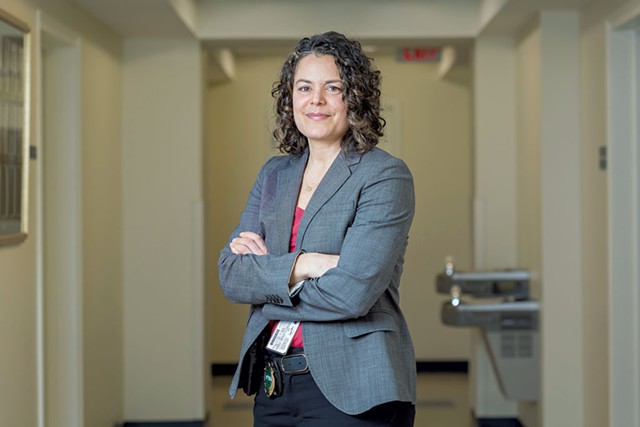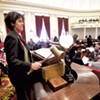Published March 25, 2015 at 10:00 a.m.
After college, Ingrid Jonas worked as a domestic-violence victims' advocate who sometimes resorted to what she described as "in your face" tactics. There was one time, for instance, when she and others picketed outside a Burlington bar, chanting the name of a police officer they believed had failed to properly respond to sexual assault there.
Two months ago, the same woman was promoted to captain in the Vermont State Police, making her the highest-ranking female in the history of the force.
Jonas, 48, described her new job, which includes overseeing the recruitment and training of new officers, as "the perfect way to make an impact on the future of the department." Among her duties: making her recent accomplishment commonplace.
Jonas grew up with two brothers and a sister in Burlington. She earned a bachelor's degree from Sarah Lawrence College, originally a women's college that remains more than 70 percent female. While in school, she interned at a New York shelter for battered women, which "totally lit my fire about justice issues for women and kids," Jonas said. After graduating, she returned to Vermont, working first at the Women's Rape Crisis Center (now HOPE Works) and later at Women Helping Battered Women.
As an advocate for victims, she encountered cops on a regular basis. Though the run-ins weren't always cordial, they ultimately prompted her career change.
Sitting in her new, somewhat cramped office at the department's Waterbury headquarters, Jonas described how she befriended a number of police officers who encouraged her to apply to be a trooper. The idea of investigating domestic violence and sexual assault crimes — in addition to dealing with their aftermath — appealed to Jonas, who was nearing 30 at the time. The application process was grueling. It included physical fitness and personality tests, a polygraph exam, and a thorough grilling about intimate subjects. But Jonas passed, and became one of only a few women participating in roughly six months of training out of the Vermont Policy Academy in Pittsford. She got her badge in 1998 and was sent to the St. Albans barracks to work as a road trooper.
It's widely accepted that police forces are most effective when they reflect the demographic makeup of the communities they serve. The fatal shooting of a black teenager by a police officer in Ferguson, Mo., and the subsequent eruption of racial tension illustrates the point. A recent Department of Justice report found institutionalized racism within the predominantly white, male Ferguson police department. Across the country, law-enforcement agencies have struggled to diversify their ranks.
The Vermont State Police remained an all-boys club until 1977, when it hired two female troopers. Integration was tumultuous. One of the first female troopers, Gloria Danforth, filed multiple grievances against the state police and a sex discrimination lawsuit that was settled out of court. Several other female troopers also took legal action.
Lt. Jocelyn Stohl joined the troopers in the mid-1980s. Now retired after 23 years, she noted in a recent interview that she initially felt pressure to prove her chops because of her gender. But Stohl also said she witnessed the agency grow more accommodating toward women over the years. She served on a committee created to address women's issues, which reviewed maternity-leave policies, procured gender-specific uniforms and served as a de facto support group for female officers. Eventually it disbanded. "I think we reached a point where it wasn't necessary," Stohl said.
Today, the Vermont State Police claims to have the highest percentage of female troopers among New England state police agencies. The number is still low — 36 of its 300 officers are women, or 12 percent. The national average for departments generally fluctuates between 10 and 13 percent.
In 2014, the state police announced that its class of 25 recruits included, for the first time, Latino and African American women. Three of the four females admitted were women of color; the rest of the recruits were white males.
Women in leadership posts are, unsurprisingly, more rare. According to Cary Brown, executive director of the Vermont Commission on Women, none of Vermont's sheriffs are female, and only three of its 62 police chiefs are women.
Despite being in the minority, Jonas insists that she's never experienced any of the harassment her predecessors faced: "Gloria had that thrown in her face. I never did." She did note that, at first, "there is the sense that men are making decisions about whether you 'rate'" — meaning whether a new recruit would be capable of backing up them in a dangerous situation.
In the office across the hall from Jonas is another recently promoted female officer. Barbara Zonay, who joined the state police in 1997, was promoted to lieutenant in early March — one of two women at that rank. Zonay echoed Jonas. "I've never been treated any differently than someone else," she said, adding, "I have heard stories of females that came before us that weren't treated very well."
Both agree that the job entails some challenges that can disproportionately impact women. Troopers work a rotating schedule that includes on-call hours, which makes for an erratic lifestyle that is not conducive to raising a family. Jonas now lives in Waterbury with her boyfriend and his son, but she didn't have children when she was a trooper. Zonay has had to juggle parental and policing duties, but she's also had support from her husband, who has a more a regular schedule.
Jonas said she has encountered sexism — but it's come from the regular citizens with whom she interacts. "I can't tell you how many times I've been called a cunt" on duty, she noted matter-of-factly. Also common: men making lewd comments during pat downs. Most upsetting was when a man Jonas arrested for sexual assault sued her, alleging false imprisonment. Jonas, who was cleared by the court, believes her gender was a driving factor.
Jonas has spent a large part of her police career investigating sexual and domestic assault cases. As a detective with a special unit, she learned how to coax victims to open up, without asking leading questions that might invalidate an interview in court. After obtaining search warrants, she'd look for corroborating evidence. "It wasn't like recovering kilos of cocaine," Jonas explained. "It was more like, are there really candles on the bedside table?" Or, "Does the uncle really have a tattoo on his inner thigh?"
A painting of two grim-looking longhaired women takes up most of one shelf on her office bookcase. Jonas explained that a woman created it for her after Jonas arrested the woman's husband. The man was convicted of repeatedly assaulting his wife and sexually abusing his daughter.
Tearing up over the memory, Jonas doesn't conform to a typical police profile. Shattering that stereotype is part of her mission. The state police have an image problem, Jonas readily acknowledged — specifically, the department is seen as a paramilitary organization. A related problem: The prototypical police officer remains "über hetero," Jonas said. She recently shelved a promotional video, determining that its "weird heavy metal music and SWAT team footage" sent the wrong message to potential recruits.
But the challenge extends beyond marketing. Despite feeling at ease as a woman, Jonas recognizes that the internal culture isn't comfortable for everyone. Case in point: There's a glaring absence of gay male cops. "I would assume it's because they don't feel safe," she said.
Jonas readily admits the police have more work ahead to diversify their ranks, but she's not thinking in terms of quotas or deadlines — or even race, sexual identity and gender. Men hailing from the military are still the most common applicants, Jonas said. She wants to reach potential recruits who share her commitment to social justice. Social workers, she argues, can be just as qualified as ex-Navy SEALs.
Screening for strength is easy — to pass the physical test, for instance, female applicants under age 29 have to complete 20 push-ups within one minute.
Assessing empathy is less straightforward.
Jonas also pointed out that finding qualified candidates in general is difficult. The state police currently have 27 vacancies. During the fall of 2013, 638 people applied but only 11 candidates met the criteria.
The new captain will have some backup outside the agency. Since 2004, Vermont Works for Women has run a nine-week training program for women considering careers in law enforcement. Thirty-six of the 60 graduates have gotten jobs in corrections or police departments, according to Rachel Jolly, who oversees the program. Jonas, she noted, was among the law-enforcement officials who volunteered to visit the class.
More recently, state police Lt. Dee Barbic started a nonprofit called Vermont Women in Law Enforcement to provide training for female officers looking to advance in the field. Barbic wrote her master's thesis in 2006 on the poor retention rate among women in the Vermont State Police. Barbic interviewed women who had left the force because they had struggled with the irregular work schedule, found better-paying jobs and were frustrated by the lack of upward mobility. She did not know whether retention had improved since she wrote her thesis, but she noted that there are now more women in leadership posts.
Jonas is one of nine captains in the hierarchical Vermont State Police — two notches below director Thomas L'Esperance, who is a colonel, and one notch below three majors.
Jonas' direct supervisor, Major Bill Sheets, is confident she'll make progress. "We think she is going to bring us to the next level," he said. "She's terrifically suited to do that because of her background."
Vermont Commission on Women's Brown is also optimistic that Jonas will improve diversity within state police ranks. And she agreed with L'Esperance when he announced in a January 21 press release that her promotion marks a "significant milestone." That said, she added, "We're all looking forward to the day when it's not a news story."
More By This Author
Speaking of...
-

State Decertifies Former Trooper Following Criminal Convictions
Jul 17, 2024 -

Vermont Pays $175,000 to Man Arrested for Giving the Middle Finger to State Trooper
Jun 26, 2024 -

State Police Trooper Fatally Shoots Man in Orange
Jun 13, 2024 -

Vermont Supreme Court Suspends Vekos' Law License for Impeding State Probe
Mar 27, 2024 -

Police Cite Addison County Prosecutor for Allegedly Driving Drunk to Crime Scene
Jan 26, 2024 - More »
Comments (2)
Showing 1-2 of 2
Comments are closed.
From 2014-2020, Seven Days allowed readers to comment on all stories posted on our website. While we've appreciated the suggestions and insights, right now Seven Days is prioritizing our core mission — producing high-quality, responsible local journalism — over moderating online debates between readers.
To criticize, correct or praise our reporting, please send us a letter to the editor or send us a tip. We’ll check it out and report the results.
Online comments may return when we have better tech tools for managing them. Thanks for reading.












































